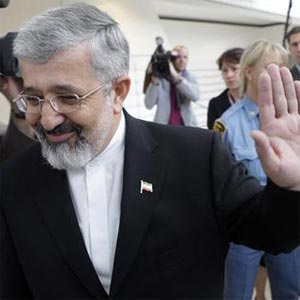Do Not Downgrade the Achievements
Why are some media criticizing the recent nuclear negotiations? By Ali Musavi Khalkhali

The recent nuclear negotiations with West have witnessed a fierce opposition from some media and websites, an opposition that seems to be based on controversy rather than a solid, realistic analysis. Surprisingly, it is the reformist media that have initiated these bashes.
But isn’t it a principle that in every temporal situation, despite the political dispositions, one should observe the national interests of the country? If the answer is yes, then why are some opposing the negotiations and downgrading the agreements made in Vienna and Geneva only for the sake of standing against Ahmadinejad?
Of course, the broadside by some senior officials such as parliamentary spokesperson Ali Larijani and his right hand Mohammad Reza Bahonar is merely pointed towards the Western side. However, the problem is with some media which see the negotiations in Geneva and Vienna through a totally black prism and believe that they were all failure.
Looking at the recent negotiations, it is clear that Iran had a great achievement. West acknowledged Iran’s right to enrich uranium in its own territory. Some say that the right is recognized only for low-enriched uranium, but the fact is that West categorically rejected Iran’s right previously. Their policy of trying to freeze Iran’s domestic enrichment cycle has now changed. This is the key achievement of the negotiations in Geneva and Vienna.
Another criticism concerns the low-enriched uranium Iran is supposed to export to Russia. The volume of this exported material has become a cause of worry for some politicians, an issue that can be negotiated in upcoming parleys. To allay their fear, it is good to know that Iran may hand a portion of its enriched uranium to Russia and West, but the enrichment process is continued inside, so the volume of our uranium stockpile will not be reduced. This point has exactly infuriated the Israelis. They are rejecting any such agreement between Iran and West and demand a full-stop to Iran’s domestic uranium enrichment activities. Thus, the negotiations in Geneva and Vienna should not be unfairly criticized. If there are problems with the agreements, they should be just explicated so that Iran comes out of the next round of elections with victory.
But isn’t it a principle that in every temporal situation, despite the political dispositions, one should observe the national interests of the country? If the answer is yes, then why are some opposing the negotiations and downgrading the agreements made in Vienna and Geneva only for the sake of standing against Ahmadinejad?
Of course, the broadside by some senior officials such as parliamentary spokesperson Ali Larijani and his right hand Mohammad Reza Bahonar is merely pointed towards the Western side. However, the problem is with some media which see the negotiations in Geneva and Vienna through a totally black prism and believe that they were all failure.
Looking at the recent negotiations, it is clear that Iran had a great achievement. West acknowledged Iran’s right to enrich uranium in its own territory. Some say that the right is recognized only for low-enriched uranium, but the fact is that West categorically rejected Iran’s right previously. Their policy of trying to freeze Iran’s domestic enrichment cycle has now changed. This is the key achievement of the negotiations in Geneva and Vienna.
Another criticism concerns the low-enriched uranium Iran is supposed to export to Russia. The volume of this exported material has become a cause of worry for some politicians, an issue that can be negotiated in upcoming parleys. To allay their fear, it is good to know that Iran may hand a portion of its enriched uranium to Russia and West, but the enrichment process is continued inside, so the volume of our uranium stockpile will not be reduced. This point has exactly infuriated the Israelis. They are rejecting any such agreement between Iran and West and demand a full-stop to Iran’s domestic uranium enrichment activities. Thus, the negotiations in Geneva and Vienna should not be unfairly criticized. If there are problems with the agreements, they should be just explicated so that Iran comes out of the next round of elections with victory.

